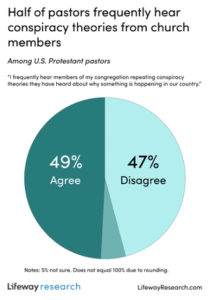The rate at which information, true and false, is disseminated to the world is both amazing and staggering. What was once relegated to print media, then to radio, then to television, has now exploded in our very hands through the smart phone and other devices. Indeed, trying to explain to our grandparents that our wrist watches also are our phones illustrates just how far technology has progressed!
Technology is both a blessing and a curse, as is painfully obvious. Advances in medicine, ability to connect with long lost friends and the advancement of the gospel across continents at the click of a button all prove the unique opportunity technology affords. Similarly, the negative effects of technology are as profound and influential as the positive ones.
At the risk of joining the negative chorus, it is important to note the negative effect that rapid information has had upon the Christian mindset. In a study by Lifeway Research, 49% of U.S. Protestant pastors say they frequently hear members of their congregation repeating conspiracy theories they have heard about why something is happening in our country; 13% strongly agree their congregants are sharing conspiracy theories.

For the average pastor, it is distressing to observe church members becoming so embroiled either in a conspiracy theory or in the latest Christian controversy—to the point of creating real division in the church. The average church member is now denouncing and attacking those they once trusted and followed. Furthermore, the division isn’t simply spreading on social media platforms, but also is infecting the local church. Christians are busy attacking ideas they don’t understand and people they do not know. Christian relationships are in jeopardy over controversies being waged in distant corners of evangelicalism. The inconsistencies in this trend are more than can be listed.
More exhausting, however, is the realization that the average church member not only is embroiled in the latest controversy and furthering the divide in American evangelicalism, but they all are trying to persuade their pastor to agree with their assessment. The days of seeking the pastor for encouragement, instruction and counsel seem to be gone. Now many conversations with the pastor center upon the effort to get him to join a certain bandwagon or agenda.
In fact, pastors not only are pressured to adhere to certain views, but if they don’t, they automatically are regarded as opposing the truth—even regarded as enemies of the truth.
What is a pastor to do? Keeping up with all the changing controversies and retaining all the terabytes of information is impossible. This conflict-saturated age seems to be an unstoppable force, and our inability to wrestle with it can leave us hopeless.
For many pastors, it is easy to feel overwhelmed. It is easy to feel defeated. It is easy to be tempted to give up. It is easy to retreat. But is there another way? Let me suggest five thoughts to encourage the pastor in such unique and trying times.
1. Keep the Gospel Central
Everyone will claim their issue is a gospel issue. It may be. But you are tasked to keep the specific and salvific message of the gospel clear and central in the life of the church. I tell my people that they can be involved in many different areas in life, as long as they don’t diminish the explicit gospel of Jesus Christ.
God will not judge us as pastors based on our ability to absorb and retain all the conspiracy theories and information circulating in the world. He will call us to account regarding the gospel’s priority in our own local churches. Don’t let your people elevate the implications of the gospel over the gospel itself.
2. Evangelism Is our Calling
It was a liberating realization for me when I learned that I don’t have to be involved in every “world-shattering” moment or issue. Though many will claim what they do is advancing the Kingdom of God, only one way truly makes that possible: taking the gospel to the whole world.
I may not know much about this ideology or that theory, but I do know the gospel and I believe it is the solution to all of life’s problems. Our calling is to make disciples of Christ in this world. That only happens as God’s people share the gospel, not engage in activism.
3. Everything Is Temporary
“What has been is what will be, and what has been done is what will be done, and there is nothing new under the sun (Eccl. 1:9).” The older we get the more this verse proves its truthfulness. The things we fight today will be vapor tomorrow. Only one thing will last and it isn’t our political affiliation, celebrity pastors or government indoctrination. The only thing that will last is the gospel of Christ and its effect upon the human soul.
It can be tempting to get caught up in the heat of the moment. But every moment fades. Pastors must stay the course in the unchanging call of the ministry. Don’t let the waves of arguments carry you to and fro.
4. Your People Need Sanctification
Pastors must have eternity in focus as they pastor today. They must remember that spiritual growth matters. I fear the church is so embroiled in controversy and arguing that not only has evangelism suffered, but our own spiritual growth has been stunted.
Your people don’t need you to play in to their fears and worries. Your people need to be sanctified. They need to be urged—and at times pushed—toward Christ. Sometimes that requires sacrificing popularity and likability. Pastoring can be a lonely calling, but God will be most pleased with the spiritual growth of His people. This is enough to push us onward.
5. Your People Need Your Leadership
As a Baptist, I believe in the autonomy of the local church. Each congregation must seek the leadership of the Lord and act accordingly. They also must do this as one body. But what if the majority of the body is wrong? Even more so, what if the pastor alone is right in his observation of and conviction about the issue?
Though pastors ought to ordinarily trust the leadership of the Lord upon the majority, there are times in which the pastor must stand alone, sound the alarm and call the people back to what is right—even if he is the only one who sees the dead end looming ahead. This is hard, but it is our calling as under-shepherds of Christ. By the very fact that the office of pastor exists, we know the sheep need to be led. If they are not led, they will wander. If they have wandered, even collectively, they need to be guided back to better pastures.
Pastoring is a unique calling. None of us are able to do it on our own. We are to teach about a God we cannot fully understand. We are to instruct in matters that are too complex. We are to teach on mysteries beyond our knowledge. We don’t deal in concrete experiences. We deal in terms of faith.
Pastoring today, with the church drowning in public division, requires a humble and bold leadership for the sake of Christ’s name. The Bride must be called back to the Bridegroom. And God’s pastors are the men set apart to issue the call.
It is a singular task. And one in which God will sustain us through to the end. Stay faithful.
This post originally appeared at Lifeway Research.
Published September 14, 2021




